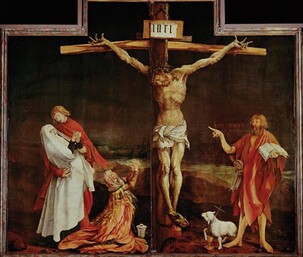
 What kind of a crucifixion do we share in on this Good Friday? Is the cross a threat, a judgement, or even a weapon? Is it simply a site and symbol of death and destruction? Or is it a pathway of transformation, for us and for our world? To help us enter it as a pathway of loving transformation, I want to offer a few words around four different images of crucifixion, which may support us in our spiritual journeying today. Each is an image from the suffering of the last century of our modern world. Each, in different ways, represents the crucifixion afresh, and encourages us to know transformation. Let me first however, in introduction, share this great image of the crucifixion from Matthias Grünewald, painted for the Isenheim Altarpiece in the hospital chapel of St Anthony’s monastery. What do you see in it?...
0 Comments
The word ‘Emerging’ has come to the fore recently. It expresses well where many people of spirit are in our lives and faith journeys. Emerging is also a central aspect of our world as a whole at present, as we engage with the uncertainties and opportunities of possible futures with and beyond Covid-19. Meanwhile, more broadly, Emergence is a powerful theme in much contemporary thinking about science, society and philosophy. Lively questions therefore surround, and stir in us. What kind of a world is it in which we live, and might like to live? What is coming into being, not least in spirituality? What difference might these things mean to our lives and our faith journeys? In other words, to reconnect with the Christian story, what, again, does Resurrection mean for us? For, as our Gospel reading today once more reminds us, Resurrection is an invitation into a more mysterious future, in the power of Love. Consequently, in the next few weeks of our Easter season, let us enter into into deeper reflection on what is emerging in us, and in our journeys with others. We begin with the body. Our Gospel today speaks of Thomas, with the other disciples, trying to make sense of Christ’s risen body. What difference did that make to them? What might the resurrection of the body mean to us?...
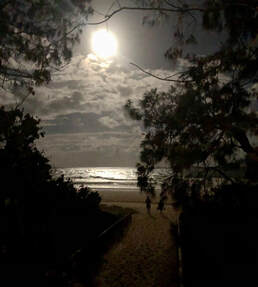 On this day we gather to remember the suffering of Christ, and those who. like Christ, have suffered: often needlessly, seemingly pointlessly. We will reflect upon seven circles of suffering: in our own person, in our family, in our close relationships, in our wider community, in our nation, in our world and in our earth. We light the Christ candle and seven candles to bring to mind those seven areas where pain is often experienced. As we reflect more deeply on each one its candle will be extinguished but the Christ candle will continue.  It is hard to find a word of comfort in today’s readings! Or is it? We shall see. These are words that come out of suffering – exile, imprisonment, exclusion, slavery. They are words spoken to and by those who know the harsh brutalities of life; its injustices and its seemingly random experiences of horror and pain, and yet choose a path of faith...  One of the joys of moving house as we have just done, is that all kinds of forgotten and unlikely treasures come to light. Indeed, among the many books that Jo and I shifted this week was a copy of the New Testament in French. My French is not wonderful, but good enough to follow familiar words. So I looked up today's Gospel reading and was struck by two words in that French translation in particular. The first was 'heureux' or happy - the word we usually translate 'blessed'. Blessed has a much more 'religious' feel to it. Quite possibly it better translates the Greek μακάριος and the French might also use the word 'beni' for that. Yet the French word 'hereux' is much more straightforward. This is what it is to be happy. Now human beings are always seeking after happiness. Preferably a quick fix of happiness. Hence the popularity of self-help programs and even lotto. We live in a culture and era where it is often assumed that happiness is about wealth, success, strength and stability. In the face of such key indicators of happiness Jesus's suggested list of the happy presents a challenge. Jesus says that the happy include the poor, the sad, the downtrodden, and the persecuted. We might question who would choose to live in such a way, let alone count themselves blessed to do so... 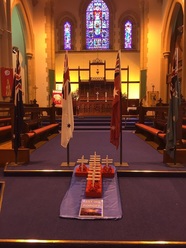 My older sister was born in 1944 when my father was fighting in Egypt in the royal signals corps of the British army. He caught diphtheria in Egypt, foolishly swimming in the Nile in the company of a dead donkey or two, and consequently did not make it home from the war till late in 1946, to face a child he had never met, a wife whose hopes for their life together had dwindled and a struggle to find employment. He had a nervous breakdown soon afterwards and would never speak of his experiences. So my knowledge of war came through my mother, who lived through the blitz in Liverpool, and told tales of rationing and lucky escapes from bombed out air raid shelters, of knitting fine wool socks and of hours of work in the munitions factory in the bitter cold of winters with no fuel. She spoke of painful partings at railway stations when Dad had come home on leave, and for the rest of her life she could not bear to wave anyone off at a train. Such were the symptoms of trauma that stretched into my childhood many years later. War is an evil and we are not here to celebrate it in any form. Wars open up opportunities for more evil, for anger, hatred, theft and human rights abuses of all kinds. Wars can shatter the human capacity for love and gentleness. Wars do not end in peace. They end in victory or defeat or dangerous stalemate. Peace, or shalom, wholeness, healing, takes a very long time afterwards to achieve and should never be let go lightly. So why are we here today? We are here to remember the sinfulness of war; to acknowledge our human tendency to make a dreadful mess of things and to pray that we may do better. Today and every Remembrance Day our veterans remember their friends who never came home. We remember those who died too young and we also remember those like my parents who did not die, but whose lives and relationships were irrevocably changed in destructive ways. We give thanks for what our veterans did on our account, and what our serving forces continue to do, and we mourn the waste of human life and love... 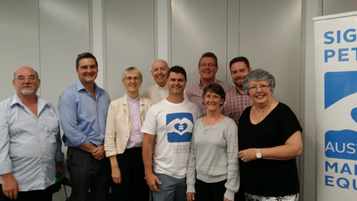 address by The Revd Dr Jon Inkpin and the Revd Penny Jones to Toowoomba Marriage Equality meeting, 17 April 2016 It is sometimes said that ‘you are either part of the problem or part of the solution’. In our case we are very much connected to part of that which indeed is often the problem, but we also hope we can be part of the solution. For we have been married to each other for 30 years, presided at marriage ceremonies for about 60 years between us, and shared both amazing joys, and, sadly, many tears with many LGBTI friends and family members for so much unnecessary pain, abuse, and rejection. So, above all, want to affirm three things which we feel are at the heart of this issue, and at the heart of Christian faith - namely: love, valuing everyone as part of God’s image, and being and growing family. We feel we need to say something briefly about two things which some misuse to hold us back: Christian tradition and the Bible. And we want to suggest three key areas of resistance. In doing so, we hope and pray for a speedy end to so much unnecessary suffering and look forward to many more tears of joy as marriage is extended and grown. We would like to begin by acknowledging the traditional custodians of the land on which we meet, the Jarowair and Giabal peoples, their elders past and present. And we do so, because this helps us nurture respect, deepen relationship, and find renewal for us all – which, of course, is what marriage equality is also about at its best. For from a Christian point of view, marriage is about sharing in the ultimate mystery of love. We only have to go to the opening words of scripture from our Anglican marriage service to see that: ‘God is love’, we say, ‘and those who live in love live in God, and God lives in them’ (1 John 4.16). For Christians, that is the heart of the matter: where is love in all of this? In the end, what would Jesus do?... I have a good friend called Peter Millar who was recently diagnosed with bone cancer. Some of you may remember him, for he visited Toowoomba a few years ago and he is quite a tour de force! Some of you may also know him from his writings. For Peter Millar is a leading member of the Iona Community in Scotland and a former Warden of Iona Abbey and he has contributed prolifically to sharing contemporary faith and engaged spirituality through many books, articles, poems and prayers. Like many contemporary Celtic Christians, he has also woven together a deep life of prayer and faith with commitment to building community locally and across the world, especially with the poor and the marginalised, and the struggles of the wider environment. Most of all, I think, Peter is an amazing person and model of encouragement for so many people, So it is particularly sad to see such personal struggles afflict such a spiritual live-wire, aflame with the love of God. Yet perhaps this is where, as in the sufferings and cross of Jesus, the love of God really comes alive and shines forth its truth….
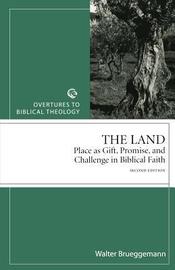 by Jon Inkpin, for Land Sunday, 14 September 2014 I wonder if you know Peter Sartsedt’s song ‘Where Do You Go To My Lovely?’ Written and released in 1969, it is about a fictional girl called Marie-Claire who becomes a member of the ‘jet set’, the fashionable celebrities of the late 1960s. Her life is full of show and excitement. Underneath however there is another reality. For her story is told from the point of view of a childhood friend who, after recounting all the amazing places Marie-Claire goes to, asks: ‘but where do you go to my lovely, when you’re asleep in your bed? Tell me the thoughts that surround you.’ Then, in the last verse of the song, the secret is revealed. Marie-Claire comes from poverty, ‘from the backstreets of Naples’ and her current life is both a welcome release and a desperate escape from that reality, full of continued scars and regret. For what we are, as people, is shaped by the realities of the places in which we are formed and raised. Only when we come to terms with those realities, their promise and their pain, are we truly set free. This is at the heart of today’s readings as we reflect upon God in the Land. For where do you go to, where do I go to, where do we go to, when we are asleep in our beds? What has our experience of land, of particular places, done for, and to, us? How does land and place shape our lives today?... |
Authors
sermons and reflections from Penny Jones & Josephine Inkpin, a same gender married Anglican clergy couple serving with the Uniting Church in Sydney Archives
June 2024
Categories
All
|
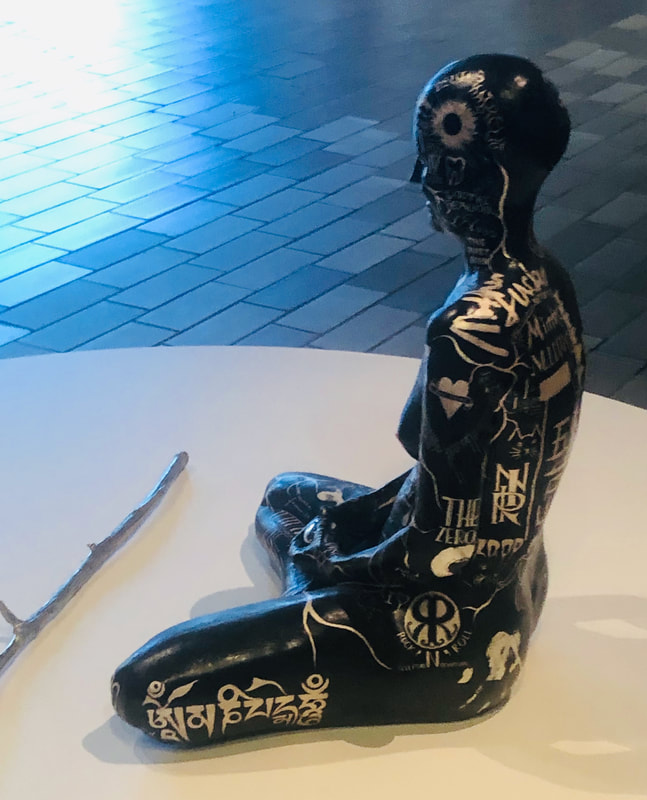
 RSS Feed
RSS Feed